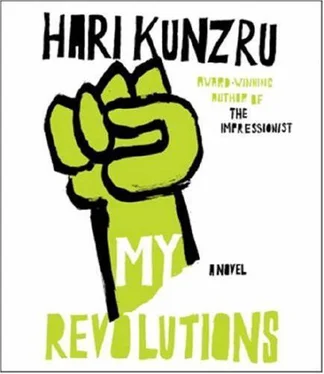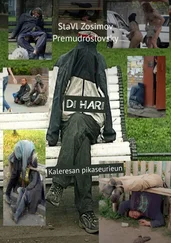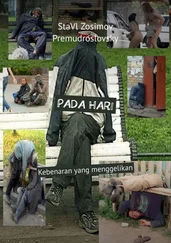I was told to leave the premises immediately and not to cause any trouble while I was about it.
Several people were arrested, all of them black. Saul had a close call: he was one of a dozen or so partygoers who escaped over the back fence and were chased by police through neighboring gardens. Earlier in the evening, Sean had been feeding him whole handfuls of drugs. When the raid happened, Saul couldn’t understand what was going on. The police were already in the room when he worked out what the blue uniforms were all about. He spent the rest of the night hiding in a flowerbed. Afterward, sleep-deprived and paranoid, he accused Sean of engineering the bust. “You wanted me put away, you bastard! Don’t deny it! You wanted those motherfuckers to get me.” Sean sneered at him, needling him with a mocking cowboy mime, blowing on six-gun fingers and adjusting an imaginary hat.
They were squaring up to each other when Anna arrived back from the phone booth. A friend had been charged with possession. She’d been trying to get him a lawyer. Saul and Sean both switched gears and started to outline competing schemes for dealing with the situation. She seemed angry with both of them. Turning her back on Sean, she asked me what I thought. I told her the truth— I didn’t know. At that moment I didn’t care. I was sick of everyone and wanted to be alone. Anna looked over at me, smiling curiously. I felt I was being assessed. I went to the pub and sat out Sunday evening with the old men, staring into my pint and trying to ignore unwanted flashes of her naked torso rocking backward and forward under orange light.
* * *
In my opinion, the Free Shop was a success. About twenty people foraged through London markets, from Billingsgate to Covent Garden, bringing back piles of food that we laid out on a stall outside Free Pictures. Anna wrote a leaflet explaining the action, giving definitions of “waste,” “redistribution,” and “socialism.” I provided some ideas, a few words and phrases, a little historical context about English civil war radicals. It was the first time the two of us worked together, sitting round the big wooden table at Charlie’s, scribbling in a notebook. I asked her where she’d learned so much political theory. “Secretarial college,” she told me tartly.
Along with our material, the Free Shop displayed handouts from a dozen organizations, promoting everything from veganism to a united Ireland. The shambolic usher from Free Pictures, who gloried in the name of Uther Pendragon, changed the lettering on the marquee to read: FREE ALL PEOPLE ALL FREE. Customers flocked to the stall. Most, I saw, were young, long-haired, and fashionably dressed. I noticed Sean staring coldly at a pair of couture hippies as they picked fastidiously through a box of bananas. Later, a few of us walked round the streets with baskets, offering food to anyone who passed by. Most people were suspicious. “What have you done to it?” was the most common question. Though younger ones took the food willingly, older ones seemed to think there was something shameful about it. One or two women poked and sniffed at the produce, then furtively slipped things into their bags, hurrying off as if they’d transacted a drug deal.
Late in the afternoon, Sean and I divided up what was left into boxes and drove Rosa to the top end of the Grove, where we parked and started knocking on doors near Harrow Road. We had them slammed in our face a couple of times. A stern-faced West Indian
church lady got really angry. How dare we offer her charity? How dare we come round there with our filthy clothes and nappy hair and act like we were better than her?
We were invited in by a young Irish couple, who were living in two rooms on the top floor of a rotting townhouse. The place should have been condemned. Damp was streaming down the walls. The toilet was on the landing, and the shared bathroom all the way downstairs. The wife, who had a persistent cough, attended to a baby while we drank tea with the husband, trying to get him to stop apologizing for not offering us a biscuit. They’d been in London just under a year. He was making a little money from building work, but the rent was high and at the end of the month, there wasn’t always enough. We left promising we’d be back.
“That was the kind of place my mum had in Hammersmith,” said Sean, as we went downstairs. “Trying to cook our tea on the landing while everyone else was waiting their turn on the hob.”
“Is she still there, your mum?”
He ignored the question. “Round here the landlords can charge what they fucking like. The tenants don’t complain because they’re grateful to have anywhere at all. You should hear Gloria tell about what it was like when she first came. No one would rent to her. She won’t have a word said against Rachman, says at least he didn’t care what color you were, long as you paid.”
“So what can we do?”
“Fuck knows. The bastards who own it all now are ten times worse than he ever was.”
That night at Charlie’s, the Free Shop collective discussed the action. Sean saw it as a total failure. The people who’d taken our food could fend for themselves. They ought to fend for themselves or, better still, join with us in helping others. Anna agreed. She said she wasn’t interested in symbolic gestures. The point was to channel resources to people who were in genuine need, not subsidize middle-class parasites. It was the first time I’d heard either of them so bitter. I decided they were right. It wasn’t enough. We had to do better.
While I tried to sort out the problems of the world, I’d been neglecting my own. I was broke and homeless. Since no one had come to see me while I was in prison, I had to assume I couldn’t rely on family or old friends. I went to sign on.
The very architecture of the dole office was humiliating. Hard benches, cubicles made from grubby prefabricated panels. I took a number and sat down opposite a poster promising Good News for Claimants . After an hour or so, I was called for an interview with a man who seemed so beaten down by his work that it was all he could do to lift a pen and fill in my form. We had a desultory conversation, then he flicked through a card index of vacancies. To my relief he decided he didn’t have anything suitable for me at the present time . I should monitor the boards in the office on a daily basis , because things often came up at short notice . I should also consider working on my personal presentation , which was often a surprisingly important factor in employers’ minds.
I looked at him, this bedraggled claims officer with his polyester jacket and his hair plastered over his scalp. I thought I should at least give him a chance. “You ever fantasize about burning this place down?”
“I’m sorry, Mr. Carver, I’m not sure I follow you.”
“Burning it down.”
He looked up from his papers. “Is that some kind of threat?”
“No, not me. I’m talking about you. Surely you must think about it once in a while. You know, when you’re on your own, late at night, glass of whisky in your hand.”
“I’m not sure I like your tone. I’ve tried to be as courteous as possible, so I don’t see why you should adopt an aggressive attitude.”
I took that as a no.
Afterward I decided to go to see Vicky. I needed an endearing prop, so I stole some flowers from the park. It was one of Vicky’s volunteering days. I hung around outside the playgroup and caught her when she went for lunch. I told her the truth, which was that I was sorry about her flat and knew she probably didn’t want to
see me but I’d needed an address to give to the dole office and, to put it bluntly, I’d used hers. She was furious, but not as furious as when I asked if she’d lend me some money. She wasn’t so much mollified by the flowers as astounded. She stared at them for a moment (they were blue flowers, hyacinths, I think) then got out her purse. I told her I’d pop by every week to get my check.
Читать дальше












